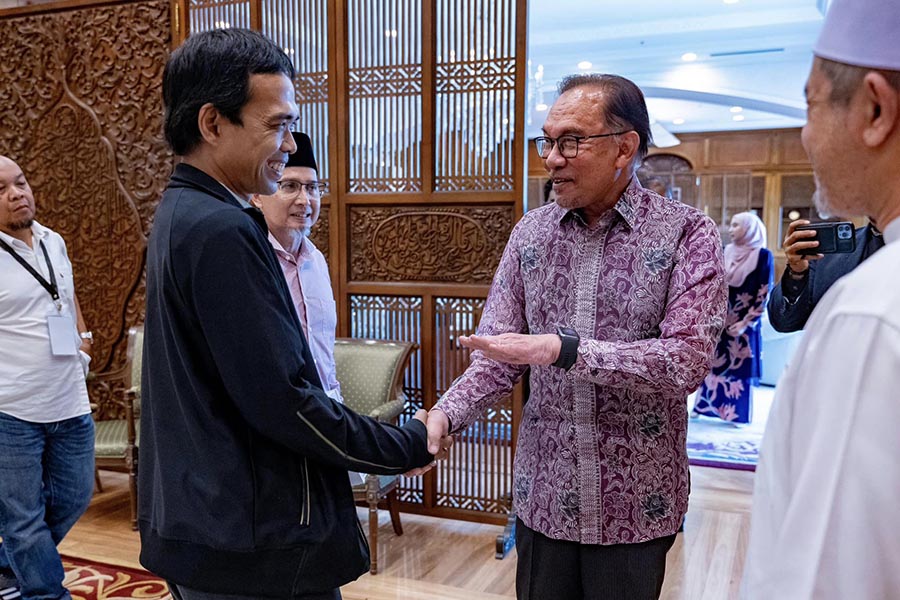Anwar Ibrahim Welcomes Abdul Somad to Putrajaya: What Gives?
On 13 July 2023, Indonesian preacher Abdul Somad Batubara visited Malaysian Prime Minister Anwar Ibrahim and apparently stayed for an hour’s conversation. 1 Commonly referred to as Ustaz Abdul Somad (or UAS), the controversial preacher has been barred from entering several countries, including being denied entry into Singapore on 16 May 2022. 2 This is due to his extremist views, which include espousing physical violence and animosity towards non-Muslims. 3
While the Singapore government’s actions were perceived by some Muslims as Islamophobic, 4 other countries including Hong Kong, Timor Leste, the United Kingdom, Germany, and Switzerland, have also barred Abdul Somad from crossing their borders. 5 This reflects the wariness with which several governments regard his questionable teachings and views.
Views such as Abdul Somad’s should be antithetical to a multi-religious society like Malaysia. It is thus surprising that Prime Minister Anwar Ibrahim so warmly welcomed such a controversial preacher to Putrajaya. In our view, this incident can be seen as a self-inflicted shot in the foot to Anwar’s framework of Malaysia Madani, which he has touted as the foundation for a more progressive Malaysia that embraces diversity and respect for all, among other core principles.
What is more, Malaysia seemingly welcomed Abdul Somad with open arms. Not only did he go straight from the airport to Putrajaya to meet Anwar, posting on social media about how he spent an hour with Anwar in his office, 6 but Abdul Somad also made a courtesy call to Malacca Governor Mohd Ali Rustam. 7 He stayed on to lecture at Dataran Sejarah, Ayer Keroh, at a celebration commemorating the Islamic new year. Abdul Somad’s presence was said to have triggered a “tsunami of believers,” pulling in about 50,000 attendees. 8 In the same audience were Mohd Ali Rustam, other state government officials, and local preachers.
It was not the first time that Abdul Somad visited Malaysia. In 2019, he visited Kelantan, Kuala Lumpur, and Negeri Sembilan in February, and Sabah in September. A quick survey of comments on his Instagram posts about this year’s visit shows his followers in Indonesia lamenting that he is poorly received in his own country but treated with respect and admiration elsewhere. The fact that Indonesia’s government views one of its own citizens with some suspicion should speak for itself.

Fig. 1: Habib Husein in a YouTube interview, speaking about the benefits of preaching through digital mediums.
On 14 July, Abdul Somad lectured at Sultan Salahuddin Abdul Aziz Shah Mosque in Shah Alam, Selangor. In the audience was Tengku Permaisuri Hajah Norashikin, the queen consort of the Sultan of Selangor. Preachers, whether local or foreign, are required to obtain a licence from a state’s Islamic Religious Council, which is headed by the Malay ruler before they can preach in a given state. Thus, this lecture was clearly sanctioned by the top state leadership.
Abdul Somad also visited a naval fleet in Lumut, Perak, gave an evening lecture to 36,000 people at a stadium in Perak and delivered another lecture in one of the state’s mosques. Upon his return to Kuala Lumpur on 15 July, he gave an evening lecture at Dataran Merdeka dressed in traditional Malay gear. The symbolism of the traditional dress (tanjak) may be interpreted by some as a nod to more conservative or even right-wing groups in Malaysia.
Abdul Somad’s time in Malaysia was a grand affair from start to end. He met not just the foremost Malaysian leader but even royalty and other politicians. On the day of his departure, 16 July, Abdul Somad received a grand farewell, leaving on a private jet arranged by a Malaysian aviation firm.
Reflecting on his meeting with Abdul Somad, Anwar stated that they “agreed on the importance of preaching about Islam in a manner that is based on moderation and wisdom.” 9 However, Anwar’s emphasis on “moderation” is clearly at odds with the well-known extremist views Abdul Somad espouses.
It is highly unlikely that Anwar is ignorant about the controversy that surrounds Abdul Somad. Aside from legitimising the use of violence against and referring to non-Muslims as infidels (a derogatory usage of kafir), Abdul Somad’s other views include supporting an Islamic caliphate and the implementation of hudud law, prohibiting Muslims from wishing Christians a “Merry Christmas,” and dismissing dialogue between Sunnis and Shi’as as void due to the perceived fundamental differences between the sects. 10
The six core principles of Malaysia Madani are sustainability, prosperity, innovation, respect, trust, and compassion. These are useful guiding principles, but other aspects of the framework might be inaccessible to the Malay/Muslim masses. For example, the Majlis Ilmu Madani lecture series, aimed at explaining the meaning of a Madani nation to the Malaysian masses, is spearheaded by international Islamic scholars who are almost unknown to the audience. The ideas in these lectures run contrary to more conservative ideas which have taken root in local discourses, which belies the lectures’ effectiveness.
Ironically, with his open welcome to Abdul Somad, Anwar might have further jeopardised the strength and popularity of his Madani framework. By embracing a preacher whose values are starkly opposed to the values that Malaysia Madani promotes – and one whose speech and sermons lack religious depth but encourage inter-religious conflict – Anwar might be playing with fire. It is a puzzle that Malaysia’s prime minister seemingly endorsed this preacher, even if Abdul Somad may have ardent followers among certain segments of the country’s Muslim population.
Mohd Faizal Musa was a Visiting Fellow at ISEAS – Yusof Ishak Institute, and he is an Associate at Weatherhead Centre Harvard University. Email: mhdfzlmusa@gmail.com
Afra Alatas is Research Officer in the Regional Social and Cultural Studies Programme at the ISEAS – Yusof Ishak Institute. Email: afra_alatas@iseas.edu.sg